BBC News
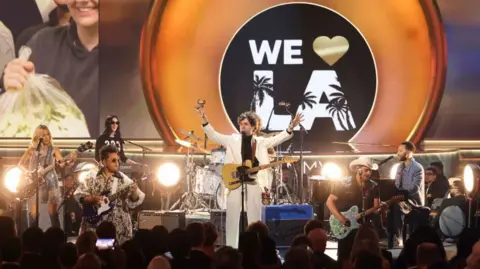 Getty Images
Getty ImagesIn a show celebrating the biggest names in music, the star of the night was the city of Los Angeles.
The historic fires that tore through Los Angeles became the theme of this year’s Grammys. Reminders of the tragedy seeped into the musical performances and donation drives for relief efforts throughout the show.
There were questions over whether the ceremony, the “Oscars for Music,” would go on as planned on Sunday after its host city saw its most devastating fire disaster ever recorded – blazes that were only fully doused on Friday after burning for 24 days.
The week of glitzy parties and events that typically mark Grammys week were cancelled. Even the hallmark rowdy after-parties were axed.
In the end, it became a moment of perseverance for the city – the epicentre of entertainment – and a chance to shed light on the intense need for those who have lost homes and loved ones.
Twenty-nine people have died and more than 16,000 homes and businesses have been destroyed – with whole neighbourhoods now ash. Many artists and industry professionals are among those who lost homes, studios and equipment.
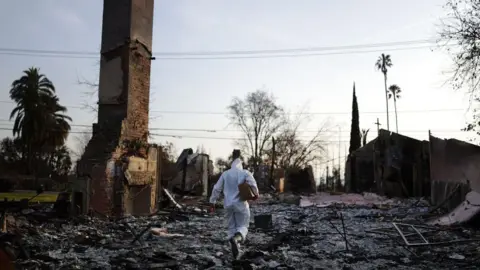 Getty Images
Getty ImagesPreformances honour LA
The awards opened with a special performance by the Los Angeles band Dawes, two brothers whose homes were destroyed in the recent wildfires.
The duo were joined on stage by former Grammy winners including Sheryl Crow, John Legend, Brad Paisley and Brittany Howard to perform Randy Newman’s classic song I Love LA.
After the performance, Dawes – brothers Taylor and Griffin Goldsmith – reflected on this moment for the city and how they’d become LA’s unofficial ambassadors in the fire aftermath.
“For a lot of musicians, you sort of feel helpless to not know how to help,” they said. “We really wanted to get involved, and so this really was a very proud moment for us.”
They noted they’d never been to the Grammys and now they helped open the show.
“It’s wild to think about our childhood dreams meeting up with an opportunity to help our communities and at such a tragic moment.”
Throughout the evening, multiple performances provided a nod to the area.
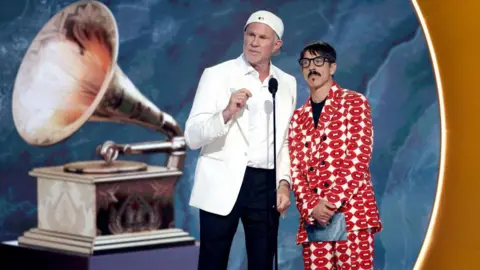 Getty Images
Getty ImagesBruno Mars and Lady Gaga sang a powerful rendition of the Mamas & the Papas classic California Dreamin’. During a segment honouring the late Quincy Jones, Stevie Wonder sang We Are the World with a choir of students from two schools lost in the fires.
The Red Hot Chili Peppers, a band synonymous with LA, also took the stage to mark the evening. The Grammys audience sang along with Chad Smith and Anthony Kiedis in an impromptu performance of their hit “Under the Bridge” – about Los Angeles.
LA firefighters also took the stage during the show. Los Angeles County Fire Chief Anthony Marrone spoke before the group and told the audience: “I am confident that we will recover and rebuild together, because we are LA strong.”
Then firefighters presented the biggest award of the night – album of the year – with Beyoncé winning the elusive honour after four losses in the category over the years.
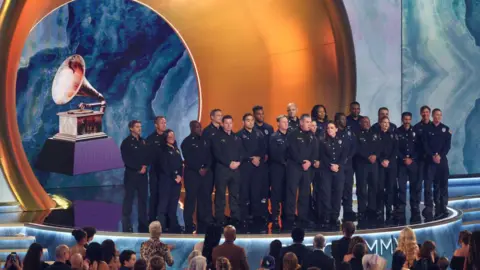 Getty Images
Getty ImagesFundraising efforts
Nearly every commercial break during the show included a nod to the fires that happened here. Footage of burned down neighbourhoods or an inside look at a skate shop or small business that was destroyed in the blazes.
Host Trevor Noah made mention of the fundraising effort throughout the show – acknowledging big donations that were made. He noted at one point during the broadcast that at least $7 million (£5.7m) had been donated thus far.
Much of the red carpet was plastered with fundraising signs and backdrops with QR codes to a Grammys website where people can donate.
As celebrities strolled along the red carpet, groups of firefighters and first responders also took their walk before the media.
They were greeted by loud applause and thank yous from everyone they passed. Many smiled and took selfies in their uniforms, some even nabbing pictures with celebrities.
One firefighter’s jaw dropped when he saw the Puerto Rican singer Luis Fonsi and they took a picture together.
Los Angeles County Fire Captain Joshua Swaney walked alongside fellow firefighters on the red carpet. He told the BBC that while it was a phenomenal experience being honoured at the event, it was a helpful reminder for the rest of the world that LA is still reeling.
“This is definitely not what we’re used to. That’s for sure. It’s been a humbling experience to be a part of this,” he said. “We are here making sure that people know that there’s so much more to Los Angeles than just what’s currently happening right now.”
To cancel the show or not?
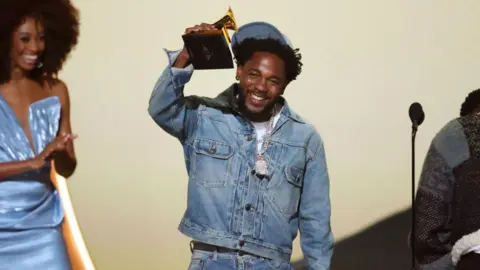 Getty Images
Getty ImagesThe Recording Academy, which runs the show, had said the show was needed more than ever.
Showrunners sought to strike the right tone honouring the victims of the fire and displaying a defiant Los Angeles that will persevere. But there was concern the optics of rich celebrities dolled up with smiles on a red carpet could come off as tone deaf.
Recording Academy CEO Harvey Mason Jr. highlighted the economic impact, noting that thousands rely on Grammy-related work, particularly in the service industry. He framed the event as a symbol of resilience, arguing that cancelling would not benefit the city or music industry.
“Cancelling, pushing, moving does not accomplish what us standing together” does, Mr Mason argued in a webcast before the show. The show will be “unifying and coming together, honouring music, but also using the power of music to heal, rebuild and provide services to people who need it”.
“I think this might be one of the most important Grammy weeks we’ve ever had.”
Mr Mason told the New York Times that they consulted a range of public officials about whether they should hold the event – including the city’s mayor and California Governor Gavin Newsom – and whether it would hinder fire response efforts.
“They strongly suggested that we continue forward with hosting the event,” he told the outlet. “Everyone said there’s nothing good that comes from postponing.”
But there were still worries that the night will be a bad look for the music industry.
“I actually don’t think that the Grammys should be happening,” Elyn Kazarian, a creative director in the music industry, told the BBC.
“It’s just very weird to me that there are going to be celebrities on a red carpet wearing expensive clothes while people in other parts of the city are suffering and whose livelihoods have been destroyed.”
Previous tragedies have impacted the Grammys
This is not the first time a major disruption has impacted the music industry’s biggest night.
In 2021, the show was postponed due to Covid-19 and was significantly altered to accommodate safety protocols. It featured a socially distanced format, with no live audience and pre-recorded performances in an intimate outdoor setting rather than the usual large-scale arena production.
Artists had to adjust to a new way of promoting their music, relying on digital platforms rather than in-person Grammy week events, which were either cancelled or moved online.
“I wouldn’t necessarily compare the COVID pandemic to what’s happening here,” senior music writer for Variety, Steven J Horowitz, told the BBC. “COVID lasted for so long and the effects were devastating for years. People had to cancel major releases, and everything shifted to a digital space.”
He said the fires are different.
“The industry has reacted in real time. It’s not as widespread as a worldwide pandemic, so people are a little more flexible on how to properly react and help those affected,” he said.
How the industry has been impacted
Artist Manager Dani Chavez told the BBC that the fires have affected many people working in LA’s music industry.
“I know multiple musicians who lost their gear”, Chavez said. “I know stylists who work in music who lost their houses, who had costumes and whatnot. I know musicians who are born and raised in LA who lost their house.”
There is also a ripple effect in the industry on those not personally impacted by the fires.
The week of events typically held before the show, which were cancelled this year to help with fundraising efforts instead, helps new musicians and allows them to break out in a crowded market – getting time with top executives and those at major record labels.
“Visibility is very important for artists,” Mr Horowitz told the BBC.
“Say you’re a Best New Artist nominee who is relatively unknown to the public – being on these platforms and at these parties is a really big look if you’re trying to get your music out in front of the industry. It really does help.”
One of the most sought-after parties is Spotify’s event honouring the nominees for Best New Artist of the year. It is half party, half concert, with previous nominees showcasing their new music, and celebrities from all parts of the entertainment industry there to celebrate.
Following the fires, Spotify chose to cancel this year’s event.
“We’ve decided that the most impactful approach is cancelling all our Grammy Week events, including our annual Best New Artist party, and redirecting funds to support efforts to reach local fans and charitable organizations,” Spotify’s Global Head of Music Partnerships and Audience Joe Hadley wrote in an announcement.
The music industry and the Grammys are deeply rooted in Los Angeles, and though the city is going through a devastating period, it has reinforced a sense of community, especially in the music industry.
“Even if people lost everything, they still have hope. And I think that feeds into what we’re going to see in the music industry in the future,” Mr Horowitz said. “People aren’t going to flee Los Angeles because of this one thing. It’s not going to stop L.A. from being one of the main hubs for music in the world.”


